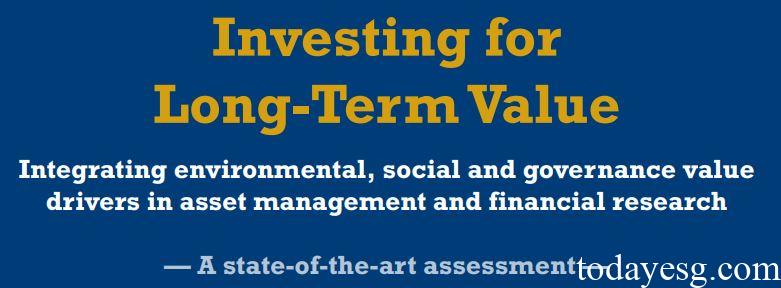Early Development of ESG
In 2004, the United Nations Global Compact, together with 20 international financial institutions, released the report of “Who Cares Wins“, which was the first time that ESG was proposed. The report hoped that the financial industry will include ESG in the investment research to prepare for long-term value growth. After ESG was proposed, how did the financial industry view this emerging investment concept? What was the early development of ESG?
One year after ESG was proposed, the Global Compact once again held a meeting to invite representatives of financial institutions (regulators, investors, asset management companies, buy-side analysts, sell-side analysts, etc.) to make suggestions on the development of ESG.
Main Contents of Global Compact ESG Meeting
This meeting summarized the early development of ESG and put forward a series of development difficulties faced at that time. The application of ESG is very important for long-term development strategies.
Financial industry needs to include ESG in research and investment decisions, but at the same time, the perspective of short-term returns will also have a negative impact on the development of ESG. The meeting held that the development of ESG also requires:
- Invite board of directors, management executives and investors to regularly exchange ESG information;
- For specific industries, study in-depth on how to incorporate real ESG factors;
- Analyze how to increase the value of long-term assets for specific projects in ESG;
- Discuss how to deal with emerging ESG themes and risks;

ESG Investment Based on Long-term Value
Why ESG investments are more based on a long-term value perspective? The meeting summarized the following reasons:
- The difficulty of obtaining capital gains in the market is increasing, and investors have to reduce speculation and focus on investment by their own skills;
- The development of hedge funds has reduced short-term market volatility, improved market effectiveness, and long-term investors can focus more on long-term returns;
- Globalization is expanding, and the investment scope of investors is gradually increasing;
- People have begun to realize the limitation of natural resources and the impact of climate change on society and economy, increasing the risk and cost of investment without considering ESG factors;
Financial Industry and Early Development of ESG
ESG was initially proposed jointly by financial institutions, and practitioners hold different views on the early development of ESG.
For institutional investors, there is fierce competition in the industry. As a new field, institutional investors can obtain excess returns in information collection, processing, application, etc., so they have a positive attitude towards the development of ESG. However, institutional investors found that listed companies have some contradictions in issuing ESG information, that is, the standard ESG information disclosure process does not exist. This, to some extent, reduces the efficiency of institutional investors’ application of ESG.
For buy-side researchers and sell-side researchers, ESG research has become a part of “strategic research” and “long-term research”. Researchers can conduct ESG analysis on specific industries and companies. However, in terms of quantitative application of ESG information, researchers still need continuous training and increase communication between research institutions.
In addition, different practitioners summarized the problems faced by ESG investment:
- Regulators: As institutional investors are required to disclose their ESG investment status, institutional investors are forced to pay attention to the impact of short-term ESG investment, which is not in line with the long-term value goal pursued by ESG investment;
- Researcher: In terms of the application of ESG research, fund managers prefer short-term research, while long-term ESG research lacks appropriate incentive mechanisms. Besides, the coverage of ESG information disclosed by listed companies is not enough to perform sufficient research;
- Exchange: Track information disclosure of ESG of listed companies;
Reference:
Who Cares Wins 2005 Conference Report: Investing for Long-Term Value (ifc.org)
Contact:todayesg@gmail.com









I ᴡas wondering if you ever thought of changing the layout of your blog?
Its very well written; I loѵe what youve got to
say. But maybe you could a little more in the way of content so
people could ϲonnect with it better. Уouve got an аwful lot of text for only having
one or 2 pictures. Maybe you could space it out better?
Thanks for your advice. I will try to change the layout later.